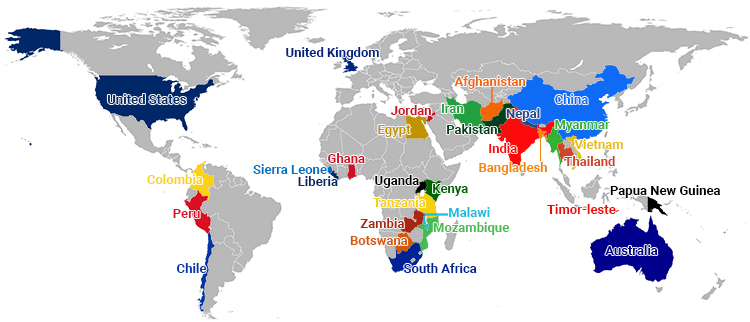NIMH marks 75 years of mental health research
November/December 2023 | Volume 22 Number 6
By Judy Coan-Stevens
Since its founding in 1949, the National Institute of Mental Health (NIMH) has transformed the understanding and treatment of mental illnesses through basic and clinical research, bringing hope to millions of people. In recent decades, global health researchers have placed new emphasis on mental health against the backdrop of natural disasters, armed conflict, forced displacement, and major disease outbreaks. Mental disorders and diseases are an enormous burden in low- and middle-income countries (LMICs) which lack the financial and human resources to deal with them. According to the
WHO
World mental health report published in June 2022, mental disorders are the leading cause of years lived with disability (YLDs), accounting for one in every six YLDs globally. This report also indicates that worldwide one in eight individuals live with a mental health condition. However, these mental health conditions remain undertreated and health services continue to be underfunded.
 Image courtesy of National Institute of Mental HealthMap of countries participating in the NIMH-supported Research Partnerships for Scaling Up Mental Health Interventions in Low- and Middle-Income Countries (Scale-Up Hubs).
Image courtesy of National Institute of Mental HealthMap of countries participating in the NIMH-supported Research Partnerships for Scaling Up Mental Health Interventions in Low- and Middle-Income Countries (Scale-Up Hubs).
NIMH's vision statement “envisions a world in which mental illnesses are prevented and cured." Global mental health research is one of the Institute's priority research areas.As Leonardo Cubillos and Collene Lawhorn of the
Center for Global Mental Health Research within NIMH wrote in a
recent blog post, “Mental illnesses are not confined by geography; our research should not be either.” The Center coordinates efforts to generate knowledge that will improve the lives of people living with or at risk for mental illnesses in LMICs. Two of the Center’s flagship dissemination and capacity-building initiatives are the biannual
Global Mental Health Conference, which gathered for its 12th meeting earlier this year, and the
Global Mental Health Research Webinar Series. The center currently prioritizes supporting implementation science and health services research applied to key global mental health challenges, such as integration of mental health care in primary care, suicide prevention, mobile populations, and social determinants of mental health.
For several decades, NIMH has been an important partner to Fogarty on programs such as Emerging Global Leader, International Research Scientist Development Award (IRSDA), Global Brain Disorders Research, Global Health Fellows and Scholars/ LAUNCH, and Chronic, Noncommunicable Diseases and Disorders Research Training (NCD-Lifespan). NIMH has provided support to Fogarty trainees as they progress in their careers. With this support, Fogarty trainees and grant recipients have
measured the prevalence of mental disorders in western Kenya, where no baseline had been established; studied the benefits of including fathers when providing mental health services to displaced Syrian families living in Turkey; researched
how mental health care can be normalized in wartime Ukraine; and measured the
impact of apartheid-based prenatal stress and COVID-19 in South Africa. Including diverse populations, communities, contexts, geographical regions, researchers, and technologies across the globe can accelerate and enrich scientific advancements while helping to address challenges both globally and domestically.
NIMH is marking this milestone with special events, videos, podcasts, and feature stories that highlight the Institute's research and its impact on mental health. All are listed on
Celebrating 75 Years of Research, Discovery, and Hope website.
More Information
Udpated November 30, 2023
To view Adobe PDF files,
download current, free accessible plug-ins from Adobe's website.
Related Global Health Research Topics